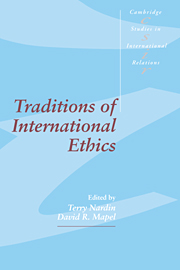Book contents
- Frontmatter
- Contents
- Contributors
- Preface
- 1 ETHICAL TRADITIONS IN INTERNATIONAL AFFAIRS
- 2 THE TRADITION OF INTERNATIONAL LAW
- 3 THE DECLARATORY TRADITION IN MODERN INTERNATIONAL LAW
- 4 CLASSICAL REALISM
- 5 TWENTIETH-CENTURY REALISM
- 6 NATURAL LAW AND INTERNATIONAL ETHICS
- 7 KANT'S GLOBAL RATIONALISM
- 8 UTILITARIANISM AND INTERNATIONAL ETHICS
- 9 THE CONTRACTARIAN TRADITION AND INTERNATIONAL ETHICS
- 10 LIBERALISM AND INTERNATIONAL REFORM
- 11 MARXISM AND INTERNATIONAL ETHICS
- 12 THE IDEA OF RIGHTS IN INTERNATIONAL ETHICS
- 13 BIBLICAL ARGUMENT IN INTERNATIONAL ETHICS
- 14 CONVERGENCE AND DIVERGENCE IN INTERNATIONAL ETHICS
- Index
- Titles in the series
1 - ETHICAL TRADITIONS IN INTERNATIONAL AFFAIRS
Published online by Cambridge University Press: 15 September 2009
- Frontmatter
- Contents
- Contributors
- Preface
- 1 ETHICAL TRADITIONS IN INTERNATIONAL AFFAIRS
- 2 THE TRADITION OF INTERNATIONAL LAW
- 3 THE DECLARATORY TRADITION IN MODERN INTERNATIONAL LAW
- 4 CLASSICAL REALISM
- 5 TWENTIETH-CENTURY REALISM
- 6 NATURAL LAW AND INTERNATIONAL ETHICS
- 7 KANT'S GLOBAL RATIONALISM
- 8 UTILITARIANISM AND INTERNATIONAL ETHICS
- 9 THE CONTRACTARIAN TRADITION AND INTERNATIONAL ETHICS
- 10 LIBERALISM AND INTERNATIONAL REFORM
- 11 MARXISM AND INTERNATIONAL ETHICS
- 12 THE IDEA OF RIGHTS IN INTERNATIONAL ETHICS
- 13 BIBLICAL ARGUMENT IN INTERNATIONAL ETHICS
- 14 CONVERGENCE AND DIVERGENCE IN INTERNATIONAL ETHICS
- Index
- Titles in the series
Summary
Ethical concerns have always been part of international affairs. “I will grant the Ammonites no reprieve, because in their greed for land they invaded the ploughlands of Gilead,” the Lord says in Amos 1:13, and his anger is perfectly intelligible to us. There are times when such judgments are out of fashion, but disdain for them is never permanent. Current judgments of the rights and wrongs of foreign policy are affected by past efforts to articulate the legitimate claims of political communities, to lay down rules for civilized diplomacy, to distinguish just and unjust wars, and to establish procedures for the peaceful settlement of international disputes. Even the issue of distributive justice, though new to the international agenda, has a long history in political thought. When we argue about international affairs we draw directly or indirectly on established traditions of ethical discourse.
The premise of this volume is that our understanding of the ethical dimension of international affairs would be enlarged by a better understanding of the traditions of conduct and inquiry that shape debate in this field. What are these traditions? How do they understand the proper ends and means of foreign policy and the moral basis of international order? What can we learn by comparing them? Can we identify areas of convergence? What differences persist both within and between traditions? By asking questions like these, we focus attention on the intellectual heritage that underlies our arguments about the ethics of international relations.
- Type
- Chapter
- Information
- Traditions of International Ethics , pp. 1 - 22Publisher: Cambridge University PressPrint publication year: 1992
- 6
- Cited by

